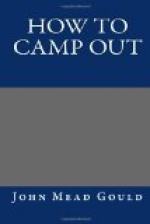To prevent foot-soreness, which is really the greatest bodily trouble you will have to contend with, you must have good shoes as already advised. You must wash your feet at least once a day, and oftener if they feel the need of it. The great preventive of foot-soreness is to have the feet, toes, and ankles covered with oil, or, better still, salve or mutton-tallow; these seem to act as lubricators. Soap is better than nothing. You ask if these do not soil the stockings. Most certainly they do. Hence wash your stockings often, or the insides of the shoes will become foul. Whenever you discover the slightest tendency of the feet to grow sore or to heat, put on oil, salve, or soap, immediately.
People differ as to these things. To some a salve acts as an irritant: to others soap acts in the same way. You must know before starting—your mother can tell you if you don’t know yourself—how oil, glycerine, salve, and soap will affect your skin. Remember, the main thing is to keep the feet clean and lubricated. Wet feet chafe and blister more quickly than dry.
The same rule applies to chafing upon any part of the body. Wash and anoint as tenderly as possible. If you have chafed in any part on previous marches, anoint it before you begin this.
When the soldiers found their pantaloons were chafing them, they would tie their handkerchiefs around their pantaloons, over the place affected, thus preventing friction, and stopping the evil; but this is not advisable for a permanent preventive. A bandage of cotton or linen over the injured part will serve the purpose better.
Another habit of the soldiers was that of tucking the bottom of the pantaloons into their stocking-legs when it was dusty or muddy, or when they were cold. This is something worth remembering. You will hardly walk a week without having occasion to try it.
Leather leggins, such as we read about in connection with Alpine travel, are recommended by those who have used them as good for all sorts of pedestrianism. They have not come into use much as yet in America.
The second day is usually the most fatiguing. As before stated, you suffer from loss of sleep (for few people can sleep much the first night in camp), you ache from unaccustomed work, smart from sunburn, and perhaps your stomach has gotten out of order. For these reasons, when one can choose his time, it is well to start on Friday, and so have Sunday come as a day of rest and healing; but this is not at all a necessity. If you do not try to do too much the first few days, it is likely that you will feel better on the third night than at any previous time.
I have just said that your stomach is liable to become disordered. You will be apt to have a great thirst and not much appetite the first and second days, followed by costiveness, lame stomach, and a feeling of weakness or exhaustion. As a preventive, eat laxative foods on those days,—figs are especially good,—and try not to work too hard. You should lay your plans so as not to have much to do nor far to go at first. Do not dose with medicines, nor take alcoholic stimulants. Physic and alcohol may give a temporary relief, but they will leave you in bad condition. And here let me say that there is little or no need of spirits in your party. You will find coffee or tea far better than alcohol.




